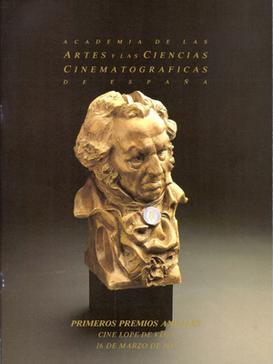
Andrés Pajares Martín is a Spanish actor, director, writer and comedian, in theater, film and television.

Adriana Ozores Muñoz is a Spanish theatre, film and television actress.
María Luisa Cela Molinero, better known by her stage name Paloma Cela, was a Spanish actress and model.

The 1st Goya Awards were presented at the Teatro Lope de Vega, Madrid on 17 March 1987, and was presented by Fernando Rey.

Antonio Ozores Puchol was a Spanish actor.

Ángel de Andrés Miquel was a Spanish theatre actor and director.

Ignacio Fernández Sánchez better known as Tony Leblanc was a Spanish actor, director, and comedian.
José Fernández Aguayo was a Spanish photography director. Throughout his career, he worked with some of the greatest Spanish film directors, such as Luis Buñuel and Fernando Fernán-Gómez.

José Manuel Martín Pérez was a Spanish film and television actor, radio broadcaster, and screenwriter. He was a popular character actor in Spanish cinema during the 1950s and 60s, best remembered for playing villainous henchmen, appearing in more than 100 film and television productions.
Don Lucio y el hermano pío is a 1960 Spanish comedy film directed by José Antonio Nieves Conde, starring Tony Leblanc and José Isbert. It tells the story of a swindler who becomes aquinted with a monk during a train ride to Madrid. Leblanc received the Best Actor award from the National Syndicate of Spectacle.
Bárbara Rey is a Spanish film and television actress. She is the daughter of Andrés García Valenzuela and Salvadora García Molina.
Forty Degrees in the Shade is a 1967 Argentine-Spanish comedy film directed by Mariano Ozores starring Gracita Morales, Antonio Ozores and Manuel Velasco.

The Daughters of Helena is a 1963 Spanish comedy film directed by Mariano Ozores and starring Isabel Garcés, Antonio Ozores and Laura Valenzuela.
María Begoña Labraga Picado, better known by the stage name of Mary Begoña, was a Spanish vedette and actress. She started dancing at age 7 and performed in venues in Madrid while she was studying at the Academies of Quiroga, Ompín and Monreal. Then she studied with Antonio Bautista and Sacha Goudine in Barcelona. She debuted in a musical revue at the age of fourteen and during Spanish Civil War was part of the CNT Union. In 1943, Begoña worked in Valencia in Juanita Reina's acting troupe, but returned to Madrid to debut in the Teatro Calderón. In 1945 she appeared in the revue Danubio Azul with Manolo Caracol and Lola Flores and the following year was the principal vedette in the revue De la Tierra a Venus. For the next several years she performed in variety shows with various acting troupes, such as Tres días para quererte (1945), ¡Róbame esta noche! (1947), A La Habana me voy (1948). In 1951, she did a season in the US and then returned to Spain appearing in ¡A vivir del cuento! (1952) and Los líos de Elías (1954). Begoña then formed her own company, which between 1953 and 1960 performed ten different plays. As her career declined in revue style shows, she began performing in comedy theater, film, and television.

Operation Mata Hari is a 1968 Spanish comedy film directed by Mariano Ozores and starring Gracita Morales, José Luis López Vázquez and Antonio Ozores. It is based on the story of the German spy Mata Hari's activities during the First World War.

María Blanca Fiorella Renzi Gil, better known as Fiorella Faltoyano, is a Spanish actress.

Al este del oeste is a 1984 Spanish comedy western film directed and written by Mariano Ozores, and starring Fernando Esteso, Conrado San Martín, Adriana Vega, Fernando Sancho and África Pratt. It was composed by Gregorio García Segura and Esteso sang in the credits.

The Ministry of the Army was a government department of Spain that was tasked with oversight of the Spanish Army during the Francoist regime.
Antonia López Arroyo, known as Adriana Vega is a former Spanish actress.
Dos hijos desobedientes is a 1960 Mexican Western musical comedy film directed by Jaime Salvador and starring Pedro Armendáriz, Antonio Aguilar, Elvira Quintana and María Duval.











